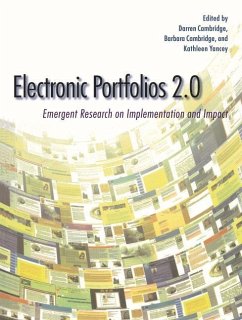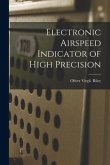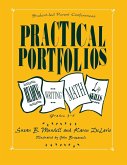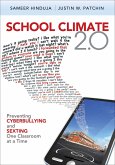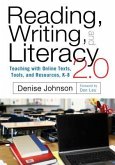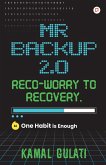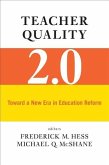Electronic Portfolios 2.0
Emergent Research on Implementation and Impact
Herausgeber: Cambridge, Darren; Cambridge, Barbara; Yancey, Kathleen Blake
Electronic Portfolios 2.0
Emergent Research on Implementation and Impact
Herausgeber: Cambridge, Darren; Cambridge, Barbara; Yancey, Kathleen Blake
- Broschiertes Buch
- Merkliste
- Auf die Merkliste
- Bewerten Bewerten
- Teilen
- Produkt teilen
- Produkterinnerung
- Produkterinnerung
Higher education institutions of all kindsacross the United States and around the worldhave rapidly expanded the use of electronic portfolios in a broad range of applications including general education, the major, personal planning, freshman learning communities, advising, assessing, and career planning.
Andere Kunden interessierten sich auch für
![Electronic Airspeed Indicator of High Precision Electronic Airspeed Indicator of High Precision]() Oliver Virgil RileyElectronic Airspeed Indicator of High Precision17,99 €
Oliver Virgil RileyElectronic Airspeed Indicator of High Precision17,99 €![Practical Portfolios Practical Portfolios]() Susan B. MundellPractical Portfolios33,99 €
Susan B. MundellPractical Portfolios33,99 €![School Climate 2.0 School Climate 2.0]() Sameer K HindujaSchool Climate 2.033,99 €
Sameer K HindujaSchool Climate 2.033,99 €![Reading, Writing, and Literacy 2.0 Reading, Writing, and Literacy 2.0]() Denise JohnsonReading, Writing, and Literacy 2.033,99 €
Denise JohnsonReading, Writing, and Literacy 2.033,99 €![The Governance Core 2.0 The Governance Core 2.0]() Davis W CampbellThe Governance Core 2.033,99 €
Davis W CampbellThe Governance Core 2.033,99 €![Mr Backup 2.0 Reco-Worry to Recovery Mr Backup 2.0 Reco-Worry to Recovery]() Kamal GulatiMr Backup 2.0 Reco-Worry to Recovery14,99 €
Kamal GulatiMr Backup 2.0 Reco-Worry to Recovery14,99 €![Teacher Quality 2.0 Teacher Quality 2.0]() Teacher Quality 2.034,99 €
Teacher Quality 2.034,99 €-
-
-
Higher education institutions of all kindsacross the United States and around the worldhave rapidly expanded the use of electronic portfolios in a broad range of applications including general education, the major, personal planning, freshman learning communities, advising, assessing, and career planning.
Hinweis: Dieser Artikel kann nur an eine deutsche Lieferadresse ausgeliefert werden.
Hinweis: Dieser Artikel kann nur an eine deutsche Lieferadresse ausgeliefert werden.
Produktdetails
- Produktdetails
- Verlag: Taylor & Francis
- Seitenzahl: 218
- Erscheinungstermin: 1. März 2009
- Englisch
- Abmessung: 277mm x 211mm x 15mm
- Gewicht: 567g
- ISBN-13: 9781579223212
- ISBN-10: 1579223214
- Artikelnr.: 24367527
- Herstellerkennzeichnung
- Libri GmbH
- Europaallee 1
- 36244 Bad Hersfeld
- gpsr@libri.de
- Verlag: Taylor & Francis
- Seitenzahl: 218
- Erscheinungstermin: 1. März 2009
- Englisch
- Abmessung: 277mm x 211mm x 15mm
- Gewicht: 567g
- ISBN-13: 9781579223212
- ISBN-10: 1579223214
- Artikelnr.: 24367527
- Herstellerkennzeichnung
- Libri GmbH
- Europaallee 1
- 36244 Bad Hersfeld
- gpsr@libri.de
Darren Cambridge is Senior Consultant for Education Technology and Online Communities of Practice for the American Institutes for Research. Kathleen Blake Yancey is Kellogg W. Hunt Professor of English and Distinguished Research Professor at Florida State University. She has focused her research agenda on portfolios for the life of her career. In 1992, she published Portfolios in the Writing Classroom; in 1996, the co-edited Situating Portfolios, in 2001, the co-edited Electronic Portfolios: Emerging Practices in Student, Faculty and Institutional Learning; and in 2009, the co-edited Electronic Portfolios 2.0: Emergent Research on Implementation and Impact. She has served on the AAC&U VALUE Steering Committee and on the Board of Directors for the Association for Authentic, Experiential and Evidence-based Learning (AAEEBL), and she is a faculty member for WASC's Assessment Leadership Academy and a mentor for WASC's Community of Practice project. Yancey has also been the president or chair of several writing studies/literacy organizations, including the Council of Writing Program Administrators (CWPA), the Conference on College Composition and Communication (CCCC), and the National Council of Teachers of English (NCTE). Immediate Past Editor of College Composition and Communication, and past co-editor of the journal Assessing Writing, she has published over 100 refereed articles and book chapters and authored, edited, or co-edited 15 scholarly books, most recently Writing Across Contexts: Transfer, Composition, and Sites of Writing; and A Rhetoric of Reflection. She has been recognized with several awards, including the CWPA Best Book Award, the CCCC Research Impact Award, the FSU Graduate Mentor Award, the FSU Graduate Teaching Award, and the CCCC Exemplar Award. Barbara Cambridge is Director of the Washington Office of the National Council of Teachers of English.
Acknowledgements; INTRODUCTION. On Transitions. Past to Present-Barbara
Cambridge; SECTION ONE. INTRODUCTION. REFLECTION IN ELECTRONIC PORTFOLIO
PRACTICE 1. Reflection and Electronic Portfolios. Inventing the Self and
Reinventing the University-Kathleen Blake Yancey, Florida State University;
2. Studying Student Reflection in an Electronic Portfolio Environment. An
Inquiry in the Context of Practice-W. H. Rickards, Alverno College and
Lauralee Guilbault; Using ePortfolios to Support Lifelong and Lifewide
Learning-Helen L. Chen, Stanford University; SECTION TWO. INTEGRATIVE
LEARNING 4. Two Faces of Integrative Learning Online-Darren Cambridge,
George Mason University; 5. Becoming ePortfolio Learners and Teachers-Julie
Hughes, Wolverhampton University; 6. Making Connections. The LaGuardia
ePortfolio-Bret Eynon, LaGuardia Community College; 7. Connecting Contexts
and Competencies. Using ePortfolios for Integrative Learning-Tracy Penny
Light, Bob Sproule, and Katherine Lithgow, University of Waterloo; SECTION
THREE. ESTABLISHING IDENTITIES. ROLES, COMPETENCIES, VALUES, AND OUTCOMES
8. Influencing Learning Through Faculty- and Student-Generated Outcome
Assessment-Michael Day, Northern Illinois University; 9. The Promise of
E-Portfolios for Institutional Assessment-Thomas S. Edwards and Colleen
Burnham, Thomas College; 10. Demonstrating Intellectual Growth and
Development. The IUPUI ePort-Sharon Hamilton and Susan Kahn, Indiana
University, Indianapolis; 11. A Values-Driven ePortfolio Journey. Na
Wa'a-Judith Kirkpatrick, Tanya Renner, Lisa Kanae, and Kelli Goya,
Kapiolani Community College; 12. E-Portfolios in an Undergraduate
Psychology Research Experiences Program-Benjamin R. Stephens, Clemson
University; 13. Perceptions of Teacher Candidates on ePortfolio Use-Neal W.
Topp and Robert L. Goeman, University of Nebraska Omaha; SECTION FOUR.
ORGANIZATIONAL LEARNING. 14. Diffusing ePortfolios in Organizational
Settings-Stephen R. Acker, The Ohio State University; 15. A Catalyst
Without a Mandate. Building an ePortfolio Culture at the University of
Washington-Tom Lewis and Janice Fournier, University of Washington; 16.
Documenting the Outcomes of Learning-Milton D. Hakel and Erin N. Smith,
Bowling Green University; 17. Sustaining Change through Student,
Departmental, and Institutional Portfolios-Kathi A. Ketcheson, Portland
State University SECTON FIVE. ELECTRONIC PORTFOLIO TECHNOLOGY AND DESIGN
FOR LEARNING 18. Technology and Change-Cara Lane, University of Washington;
19. Re-visioning Revision with ePortfolios in the University of Georgia
First-year Composition Program-Christy Desmet, June Griffin, Deborah Church
Miller, Ron Balthazor, and Robert Cummings, University of Georgia; 20.
Moving eFolio Minnesota to the Next Generation. From Individual Portfolios
to an Integrated Institutional Model-Lynette Olson, Lori Schroeder, and
Paul Wasko, Minnesota State Colleges and Universities; 21. Assessing the
Learning Potential of E-Portfolio Through Thinking Sheets-Mary Zamon and
Debra Sprague, George Mason University; 22. The Maed English Education
Electronic Portfolio Experience. What Preservice English Teachers Have to
Teach Us About Eps and Reflection-Carl Y oung; CONCLUSION. MOVING INTO THE
FUTURE-Barbara Cambridge, Darren Cambridge, and Kathleen Yancey; Index.
Cambridge; SECTION ONE. INTRODUCTION. REFLECTION IN ELECTRONIC PORTFOLIO
PRACTICE 1. Reflection and Electronic Portfolios. Inventing the Self and
Reinventing the University-Kathleen Blake Yancey, Florida State University;
2. Studying Student Reflection in an Electronic Portfolio Environment. An
Inquiry in the Context of Practice-W. H. Rickards, Alverno College and
Lauralee Guilbault; Using ePortfolios to Support Lifelong and Lifewide
Learning-Helen L. Chen, Stanford University; SECTION TWO. INTEGRATIVE
LEARNING 4. Two Faces of Integrative Learning Online-Darren Cambridge,
George Mason University; 5. Becoming ePortfolio Learners and Teachers-Julie
Hughes, Wolverhampton University; 6. Making Connections. The LaGuardia
ePortfolio-Bret Eynon, LaGuardia Community College; 7. Connecting Contexts
and Competencies. Using ePortfolios for Integrative Learning-Tracy Penny
Light, Bob Sproule, and Katherine Lithgow, University of Waterloo; SECTION
THREE. ESTABLISHING IDENTITIES. ROLES, COMPETENCIES, VALUES, AND OUTCOMES
8. Influencing Learning Through Faculty- and Student-Generated Outcome
Assessment-Michael Day, Northern Illinois University; 9. The Promise of
E-Portfolios for Institutional Assessment-Thomas S. Edwards and Colleen
Burnham, Thomas College; 10. Demonstrating Intellectual Growth and
Development. The IUPUI ePort-Sharon Hamilton and Susan Kahn, Indiana
University, Indianapolis; 11. A Values-Driven ePortfolio Journey. Na
Wa'a-Judith Kirkpatrick, Tanya Renner, Lisa Kanae, and Kelli Goya,
Kapiolani Community College; 12. E-Portfolios in an Undergraduate
Psychology Research Experiences Program-Benjamin R. Stephens, Clemson
University; 13. Perceptions of Teacher Candidates on ePortfolio Use-Neal W.
Topp and Robert L. Goeman, University of Nebraska Omaha; SECTION FOUR.
ORGANIZATIONAL LEARNING. 14. Diffusing ePortfolios in Organizational
Settings-Stephen R. Acker, The Ohio State University; 15. A Catalyst
Without a Mandate. Building an ePortfolio Culture at the University of
Washington-Tom Lewis and Janice Fournier, University of Washington; 16.
Documenting the Outcomes of Learning-Milton D. Hakel and Erin N. Smith,
Bowling Green University; 17. Sustaining Change through Student,
Departmental, and Institutional Portfolios-Kathi A. Ketcheson, Portland
State University SECTON FIVE. ELECTRONIC PORTFOLIO TECHNOLOGY AND DESIGN
FOR LEARNING 18. Technology and Change-Cara Lane, University of Washington;
19. Re-visioning Revision with ePortfolios in the University of Georgia
First-year Composition Program-Christy Desmet, June Griffin, Deborah Church
Miller, Ron Balthazor, and Robert Cummings, University of Georgia; 20.
Moving eFolio Minnesota to the Next Generation. From Individual Portfolios
to an Integrated Institutional Model-Lynette Olson, Lori Schroeder, and
Paul Wasko, Minnesota State Colleges and Universities; 21. Assessing the
Learning Potential of E-Portfolio Through Thinking Sheets-Mary Zamon and
Debra Sprague, George Mason University; 22. The Maed English Education
Electronic Portfolio Experience. What Preservice English Teachers Have to
Teach Us About Eps and Reflection-Carl Y oung; CONCLUSION. MOVING INTO THE
FUTURE-Barbara Cambridge, Darren Cambridge, and Kathleen Yancey; Index.
Acknowledgements; INTRODUCTION. On Transitions. Past to Present-Barbara
Cambridge; SECTION ONE. INTRODUCTION. REFLECTION IN ELECTRONIC PORTFOLIO
PRACTICE 1. Reflection and Electronic Portfolios. Inventing the Self and
Reinventing the University-Kathleen Blake Yancey, Florida State University;
2. Studying Student Reflection in an Electronic Portfolio Environment. An
Inquiry in the Context of Practice-W. H. Rickards, Alverno College and
Lauralee Guilbault; Using ePortfolios to Support Lifelong and Lifewide
Learning-Helen L. Chen, Stanford University; SECTION TWO. INTEGRATIVE
LEARNING 4. Two Faces of Integrative Learning Online-Darren Cambridge,
George Mason University; 5. Becoming ePortfolio Learners and Teachers-Julie
Hughes, Wolverhampton University; 6. Making Connections. The LaGuardia
ePortfolio-Bret Eynon, LaGuardia Community College; 7. Connecting Contexts
and Competencies. Using ePortfolios for Integrative Learning-Tracy Penny
Light, Bob Sproule, and Katherine Lithgow, University of Waterloo; SECTION
THREE. ESTABLISHING IDENTITIES. ROLES, COMPETENCIES, VALUES, AND OUTCOMES
8. Influencing Learning Through Faculty- and Student-Generated Outcome
Assessment-Michael Day, Northern Illinois University; 9. The Promise of
E-Portfolios for Institutional Assessment-Thomas S. Edwards and Colleen
Burnham, Thomas College; 10. Demonstrating Intellectual Growth and
Development. The IUPUI ePort-Sharon Hamilton and Susan Kahn, Indiana
University, Indianapolis; 11. A Values-Driven ePortfolio Journey. Na
Wa'a-Judith Kirkpatrick, Tanya Renner, Lisa Kanae, and Kelli Goya,
Kapiolani Community College; 12. E-Portfolios in an Undergraduate
Psychology Research Experiences Program-Benjamin R. Stephens, Clemson
University; 13. Perceptions of Teacher Candidates on ePortfolio Use-Neal W.
Topp and Robert L. Goeman, University of Nebraska Omaha; SECTION FOUR.
ORGANIZATIONAL LEARNING. 14. Diffusing ePortfolios in Organizational
Settings-Stephen R. Acker, The Ohio State University; 15. A Catalyst
Without a Mandate. Building an ePortfolio Culture at the University of
Washington-Tom Lewis and Janice Fournier, University of Washington; 16.
Documenting the Outcomes of Learning-Milton D. Hakel and Erin N. Smith,
Bowling Green University; 17. Sustaining Change through Student,
Departmental, and Institutional Portfolios-Kathi A. Ketcheson, Portland
State University SECTON FIVE. ELECTRONIC PORTFOLIO TECHNOLOGY AND DESIGN
FOR LEARNING 18. Technology and Change-Cara Lane, University of Washington;
19. Re-visioning Revision with ePortfolios in the University of Georgia
First-year Composition Program-Christy Desmet, June Griffin, Deborah Church
Miller, Ron Balthazor, and Robert Cummings, University of Georgia; 20.
Moving eFolio Minnesota to the Next Generation. From Individual Portfolios
to an Integrated Institutional Model-Lynette Olson, Lori Schroeder, and
Paul Wasko, Minnesota State Colleges and Universities; 21. Assessing the
Learning Potential of E-Portfolio Through Thinking Sheets-Mary Zamon and
Debra Sprague, George Mason University; 22. The Maed English Education
Electronic Portfolio Experience. What Preservice English Teachers Have to
Teach Us About Eps and Reflection-Carl Y oung; CONCLUSION. MOVING INTO THE
FUTURE-Barbara Cambridge, Darren Cambridge, and Kathleen Yancey; Index.
Cambridge; SECTION ONE. INTRODUCTION. REFLECTION IN ELECTRONIC PORTFOLIO
PRACTICE 1. Reflection and Electronic Portfolios. Inventing the Self and
Reinventing the University-Kathleen Blake Yancey, Florida State University;
2. Studying Student Reflection in an Electronic Portfolio Environment. An
Inquiry in the Context of Practice-W. H. Rickards, Alverno College and
Lauralee Guilbault; Using ePortfolios to Support Lifelong and Lifewide
Learning-Helen L. Chen, Stanford University; SECTION TWO. INTEGRATIVE
LEARNING 4. Two Faces of Integrative Learning Online-Darren Cambridge,
George Mason University; 5. Becoming ePortfolio Learners and Teachers-Julie
Hughes, Wolverhampton University; 6. Making Connections. The LaGuardia
ePortfolio-Bret Eynon, LaGuardia Community College; 7. Connecting Contexts
and Competencies. Using ePortfolios for Integrative Learning-Tracy Penny
Light, Bob Sproule, and Katherine Lithgow, University of Waterloo; SECTION
THREE. ESTABLISHING IDENTITIES. ROLES, COMPETENCIES, VALUES, AND OUTCOMES
8. Influencing Learning Through Faculty- and Student-Generated Outcome
Assessment-Michael Day, Northern Illinois University; 9. The Promise of
E-Portfolios for Institutional Assessment-Thomas S. Edwards and Colleen
Burnham, Thomas College; 10. Demonstrating Intellectual Growth and
Development. The IUPUI ePort-Sharon Hamilton and Susan Kahn, Indiana
University, Indianapolis; 11. A Values-Driven ePortfolio Journey. Na
Wa'a-Judith Kirkpatrick, Tanya Renner, Lisa Kanae, and Kelli Goya,
Kapiolani Community College; 12. E-Portfolios in an Undergraduate
Psychology Research Experiences Program-Benjamin R. Stephens, Clemson
University; 13. Perceptions of Teacher Candidates on ePortfolio Use-Neal W.
Topp and Robert L. Goeman, University of Nebraska Omaha; SECTION FOUR.
ORGANIZATIONAL LEARNING. 14. Diffusing ePortfolios in Organizational
Settings-Stephen R. Acker, The Ohio State University; 15. A Catalyst
Without a Mandate. Building an ePortfolio Culture at the University of
Washington-Tom Lewis and Janice Fournier, University of Washington; 16.
Documenting the Outcomes of Learning-Milton D. Hakel and Erin N. Smith,
Bowling Green University; 17. Sustaining Change through Student,
Departmental, and Institutional Portfolios-Kathi A. Ketcheson, Portland
State University SECTON FIVE. ELECTRONIC PORTFOLIO TECHNOLOGY AND DESIGN
FOR LEARNING 18. Technology and Change-Cara Lane, University of Washington;
19. Re-visioning Revision with ePortfolios in the University of Georgia
First-year Composition Program-Christy Desmet, June Griffin, Deborah Church
Miller, Ron Balthazor, and Robert Cummings, University of Georgia; 20.
Moving eFolio Minnesota to the Next Generation. From Individual Portfolios
to an Integrated Institutional Model-Lynette Olson, Lori Schroeder, and
Paul Wasko, Minnesota State Colleges and Universities; 21. Assessing the
Learning Potential of E-Portfolio Through Thinking Sheets-Mary Zamon and
Debra Sprague, George Mason University; 22. The Maed English Education
Electronic Portfolio Experience. What Preservice English Teachers Have to
Teach Us About Eps and Reflection-Carl Y oung; CONCLUSION. MOVING INTO THE
FUTURE-Barbara Cambridge, Darren Cambridge, and Kathleen Yancey; Index.

